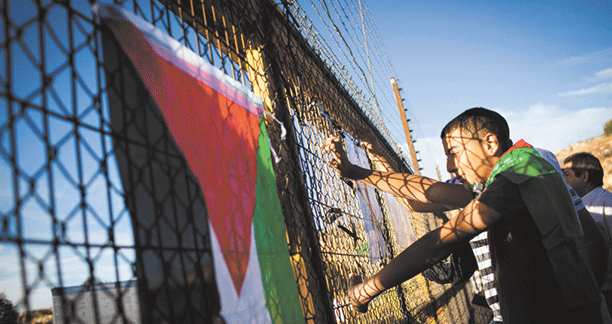Apartheid regime lashes out in Palestine

The largest military crackdown on the Occupied West Bank in more than a decade has left eight Palestinians dead and more than 130 wounded. Thousands of homes have been raided, and more than 560 Palestinians have been arrested and detained without charge or trial.
Among those arrested are Palestinian Legislative Council members, 50 former political prisoners released during the Gilad Shalit exchange and former political prisoner and hunger striker Samer Issawi.
Air strikes have also pounded the Gaza Strip. The military crackdown, dubbed “Operation Brother’s Keeper” by the Israeli occupation forces, comes in the wake of the alleged kidnapping of three Israeli settler youth on 12 June.
The assault is nominally about finding and arresting those responsible for the alleged kidnapping, but Prime Minister Benjamin Netanyahu has made it clear that the primary aim is to undermine the new Palestinian technocratic “unity government” formed by Fatah and Hamas on 2 June. Netanyahu has repeatedly blamed Hamas for the alleged kidnapping, and claims that Israel has “unequivocal proof” that the organisation was responsible.
Israel’s secret police agency Shin Bet on 26 June named two former Palestinian political prisoners as the alleged kidnappers. The only proof offered was that they are members of Hamas and have been missing since the alleged kidnapping took place. Hamas has denied involvement.
Journalist Ron Ben-Yishai, in a 27 June article published at the English language news site for Israel’s largest Hebrew daily, Yedioth Ahronot, noted that in reality Shin Bet had “no strong leads”. But publishing the names and photos of the two men “serves Israel’s diplomacy, mainly for Prime Minister Benjamin Netanyahu, because it [allegedly] proves it was Hamas who is responsible for the [alleged] abduction of the three boys”.
“[T]his is exactly what Netanyahu needed to turn public opinion in Europe and the US against the reconciliation between the Palestinian Authority and Hamas.” An additional reason for naming the two men was, according to Ben-Yishai, “to prove that the Shin Bet is making progress and not groping in the dark”.
Other Israeli news media have reported that Israel’s military operation had – at least in part – been planned before the three settlers went missing. The Hebrew news outlet Hadrei Hadarim quoted a senior Israeli military officer as saying the goal of the operation was not the release of the allegedly kidnapped settlers but instead to “provoke [Palestinians] into causing disorder and then put down those causing the disorder”.
The Israeli crackdown has involved repeated invasions of Palestinian universities, including Birzeit University near Ramallah and the Arab American University in Jenin. In Bethlehem, Israeli soldiers used the main plaza of Ahliya University as a holding ground for blindfolded Palestinians who had been arrested during raids on Dheisha refugee camp. At Al Quds University in occupied East Jerusalem, Israeli forces fired tear gas, injuring many students.
Birzeit University labelled Israel’s actions “barbaric aggression”. A 19 June statement from the university noted that the invasion of its campus was “a blatant attack on the right to education”.
The Palestinian Authority, led by Fatah leader Mahmoud Abbas, has come under increasing criticism for continuing “security coordination” with Israel. The cooperation of US-financed PA intelligence and security services is a means to suppress any Palestinian resistance to Israel’s occupation and apartheid policies. Abbas told Israeli journalists in May that the cooperation was “sacred”.
On 22 June, when Israeli forces invaded Ramallah, Palestinian youth attempting to repel them also turned their anger against the Palestinian Authority, stoning the PA police headquarters. The attack came three days after PA police beat the mothers and wives of hunger striking Palestinian political prisoners. In Hebron, the city worst hit by Israel’s current military crackdown, Palestinians have also staged protests demanding an end to the “security coordination”.
Protests against Israel’s crackdown have not been limited to the West Bank, but have also occurred inside Israel.